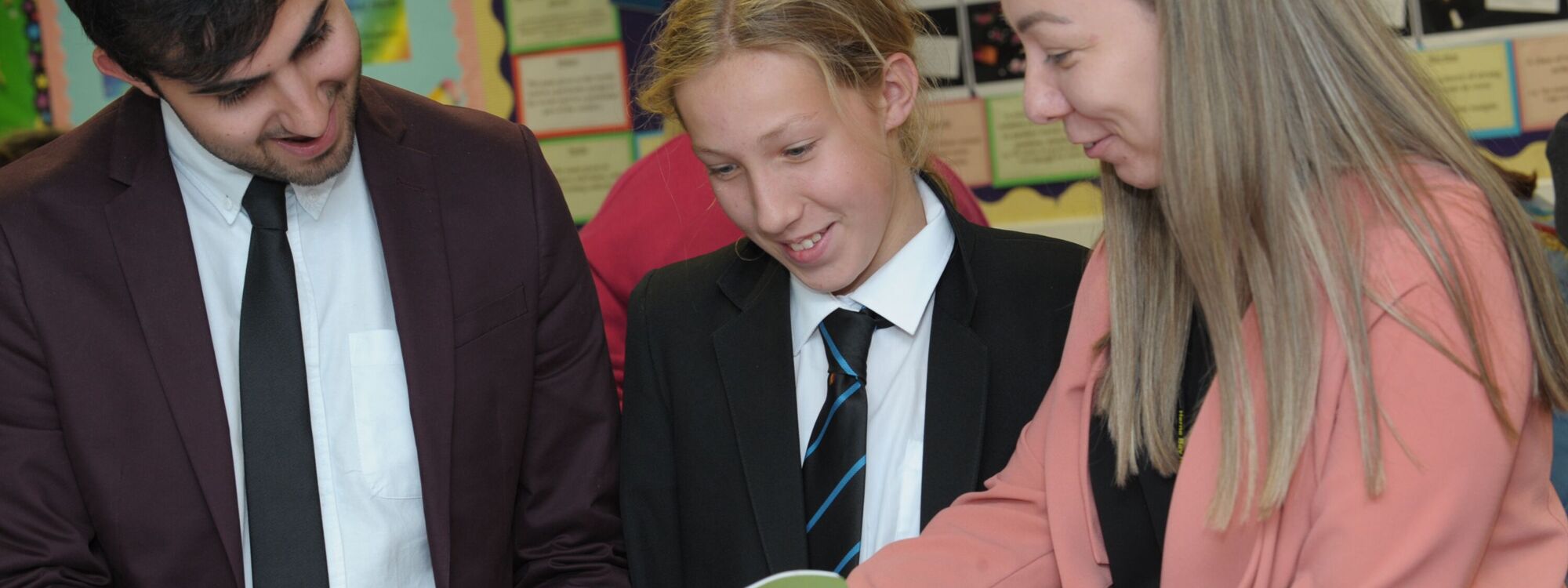
English and Literacy
- Home
- Curriculum
- Subject Information
- English and Literacy
Head of Department: Ms A Martin
“Electric communication will never be a substitute for the face of someone who, with their soul, encourages another person to be brave and true.” - Charles Dickens
English at Herne Bay High focuses on stimulating, training and encouraging students to improve their written and spoken communication in all areas of the curriculum. Good communication skills are vital in our communities, families and later needed in industry, and our desire is to ensure that all students are taught how to communicate with each other and that we equip them with words that empower them to be brave and true.
There are fifteen specialist English teachers in the department, trained to teach across all key stages. We work in close collaboration with the Learning Resource Team, and there are multiple opportunities for student volunteers to gain new skills, either by mentoring younger students or by working as a library monitor at lunchtimes. In addition, we are in close proximity to the lecture theatre which seats 90 and can be used as a large learning space, or theatre. This plethora of resources enhances students’ all-round learning experiences and encourage independent learning.
Teaching Staff
- Ms A Martin - Head of Faculty
- Miss Amos
- Mrs Arr-Jones
- Ms Clarke
- Mrs Diamond
- Mrs Edwards
- Ms Hobbs
- Mr Homan
- Dr Powell
- Ms Reece
- Mrs Reynolds
- Miss Spencer
- Miss Ward
- Mrs Weston
- Miss Woodhouse
English Clubs and Trips
- Booked Buzz! Year 7 – Autumn Term
- National Poetry Day
- Reading Curriculum for KS3 using accelerated reader
- Reading festival
- World Book Day
- Carnegie Shadowing
- Literacy Support Mentors – student mentors working with other students, all year groups
- Creative writing club
- Debate club
- Reading club
- Masterclass
What do our children study?
All pupils in KS3 have a dedicated reading lesson once a week in order to develop culturally, emotionally, intellectually, socially and spiritually. The reading curriculum also enables pupils both to acquire knowledge and to build on what they already know and are learning elsewhere, particularly in their main English lessons. The purpose of a reading lesson is to give children the time to practise their reading skills in a structured and supportive environment, whilst gradually increasing the challenge, so that they are prepared for the vast range of reading required across subjects at each key stage of education.
The aims of the KS3 reading curriculum are for pupils to:
- read easily, fluently and with good understanding
- develop the habit of reading widely and often, for both pleasure and information
- acquire a wide vocabulary, an understanding of grammar and knowledge of linguistic conventions used across texts
- appreciate our rich and varied literary heritage
- use discussion in order to learn; they should be able to elaborate and explain clearly their understanding and ideas
In order to support our reading curriculum and to monitor progress, we use Accelerated Reader.
OCR GCSE Language: Students in year 10 and 11 follow the GCSE English Language syllabus. This course is examined through two exam papers, each worth 50%. Each exam paper has a reading section and a writing section, which are equally weighted.
Click here for exam board information on GCSE English / English Language
OCR GCSE English Literature: Students in year 10 and 11 follow the GCSE English Literature syllabus. This course is examined through two exam papers, each worth 50%. Each exam paper is further subdivided into a section A and Section B.
The texts studied for GCSE Literature are:
Paper 1 – An Inspector Calls, and Strange Case of Dr Jekyll and Mr Hyde.
Paper 2 – Relationships poetry and Romeo and Juliet.
Click here for exam board information on GCSE English Literature
OCR A-Level English Literature: The A-Level is assessed through both terminal exam (80%) and coursework (20%).
Texts Studied:
Twelfth Night
The poetry of Christina Rossetti and Alfred, Lord Tennyson
A Streetcar Named Desire and Small Island (Coursework)
The Bloody Chamber and Other Stories
Dracula
A Doll’s House
Click here for exam board information on A-Level English Literature
OCR AS and A-Level English Language and Literature: The A-Level is assessed through both terminal exam (80%) and coursework (20%).
Texts Studied:
Anthology of Non-Fiction Texts
The poetry of Carol Ann Duffy
The Great Gatsby
A Streetcar Named Desire
Click here for exam board information on A-Level English Language and Literature